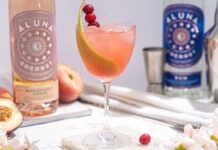
Trade helps celebrate golden anniversary of Scotland’s pubs paper
SLTN is celebrating five decades of reporting on the Scottish licensed trade.
The special 50th anniversary supplement included with the November 27, 2014 issue of SLTN features a look back at some of the top stories covered by SLTN since it launched in 1964 as well as comments from operators, wholesalers and drinks companies on the important role the paper has played over the last five decades.
It doesn’t take long to see the trade is a vastly different place in 2014 to what it was fifty, or even twenty, years ago.
Donald Campbell, sales director at Inverarity Morton – and who has worked in the Scottish drinks industry since 1981 – said technology has been one of the biggest game-changers in the industry in recent decades.


“In my first job my sales manager would phone you at six or seven o’clock at night because it was the only way he could get hold of you,” said Campbell.
“He’d brief you on your home phone, and you’d then have monthly meetings face-to-face.
“Now you have smartphones, the internet, iPads – all my guys carry an iPad that can access current stock, vintages, credit, last week’s sales, current orders.
“They’ve got instant information. When I started we couldn’t have dreamed that level of communication and information would be available.”
Campbell added that while the industry is “much more professional” now than it was in the past, “there was more loyalty there 20 years ago than there is today”.
“People were loyal to brands, to businesses, to specific reps,” he said.
“You bought Black Bottle whisky because you liked Donald Campbell. I don’t think there’s as much of that now.”
Scottish drinks veteran Bob Taylor, who worked for Bell’s whisky in the 1970s and ‘80s, helped launch Magners into Scotland in the late 1990s and now works with Rekorderlig, agreed the industry was “more personal” in the past, but he argued that relationships are as important as ever.
“People in the trade appreciate you if you go back and build up a relationship,” he said.
And Taylor praised Scottish pubs for their innovation, particularly with regard to food.
“The food side has been the biggest change I’ve seen,” he said.
“You need food now. There’s not many outlets can survive without it.”
[hr]
Long eggs and peeling potatoes
THEY may not have had EPOS and iPads in the early days of SLTN, but from “space-aged” microwaves (SLTN 1973) to a pioneering “robot-operated distillery of tomorrow” (SLTN 1965), the trade has always had its own ideas about its future.
In 1971, America returned to the moon, The Two Ronnies debuted on BBC 1 and the UK switched to decimal currency.
At SLTN, “What foods shall we be eating in the ‘90s?” was the question.
“How much longer shall we be putting up with the messy and wasteful business of peeling potatoes? Certainly not for a further 20 years,” SLTN reported. “By the 1990s the traditional domestic way of preparing roast, boiled, mashed or chipped potatoes will be a virtually forgotten culinary art.”
We can also all breathe a sigh of relief that the predicted dominance of the “long egg” did not come to pass.
The “long tubular form like seaside rock” may have appealed to some in the ‘70s, but despite removing the “chores” of preparing an egg sandwich it doesn’t seem to have set the heather on fire as was expected.
Other predictions did, however, come to pass.
Scampi, the “pub fare with a luxury touch” (SLTN 1971), became synonymous with pub grub; the trade did “benefit handsomely” from the introduction of Sunday opening (SLTN 1965); and the vodka boom prediction (SLTN 1964) did indeed happen.

























